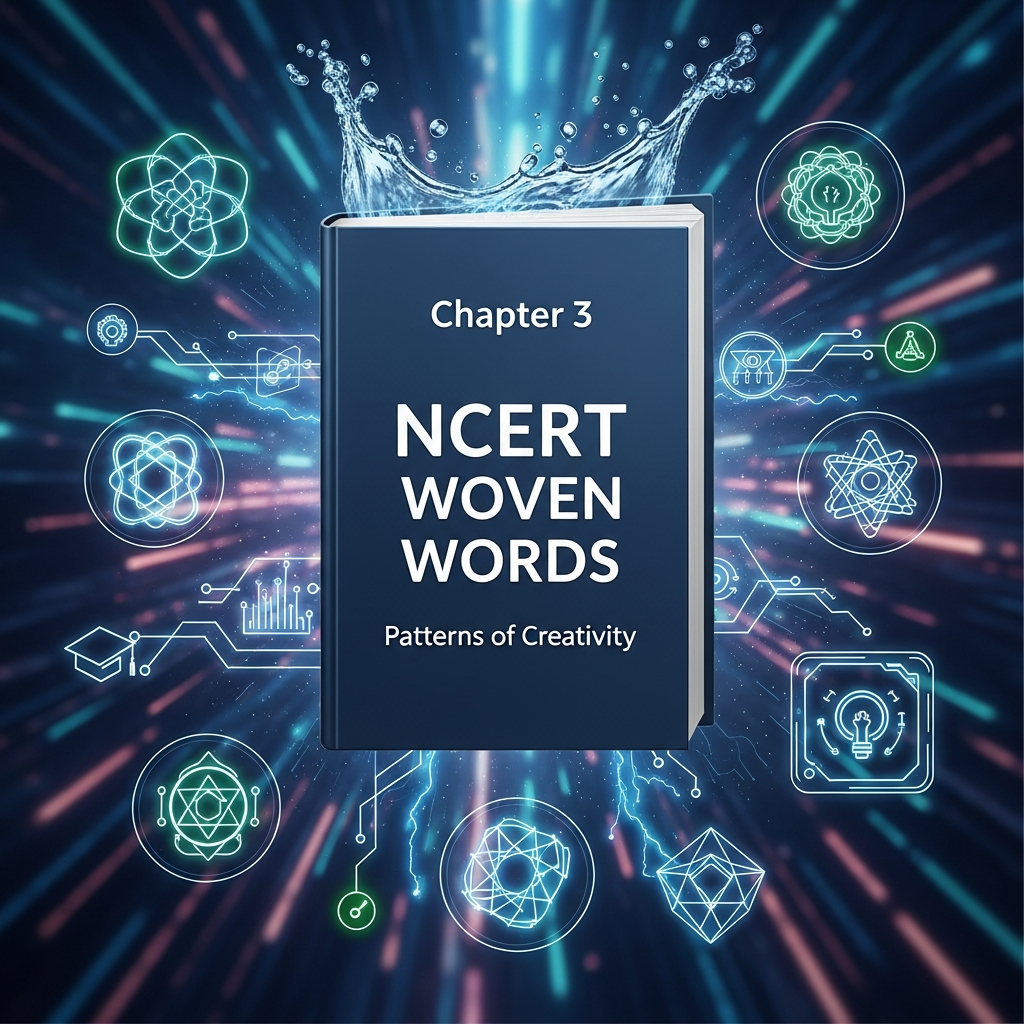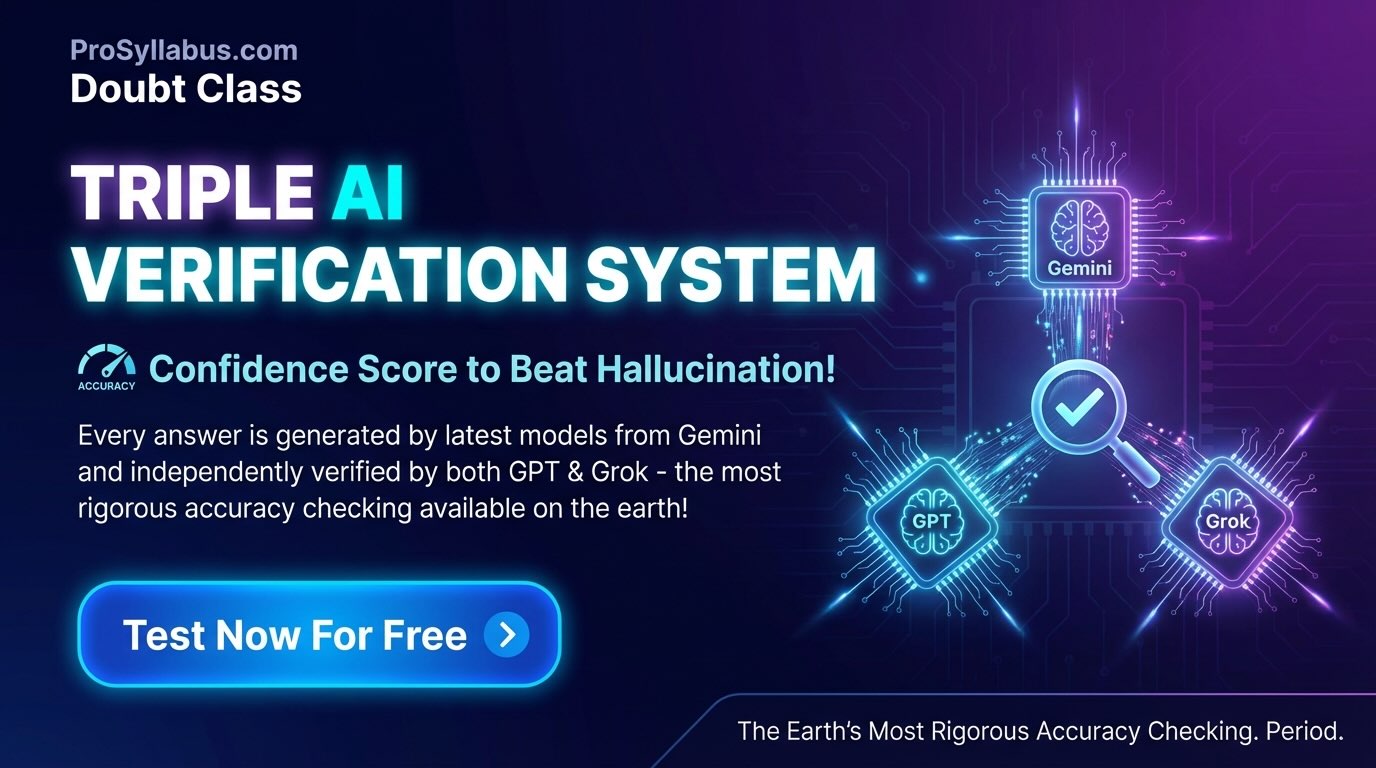Complete Summary and Solutions for Patterns of Creativity – NCERT Class XI English Woven Words, Essay Section, Chapter 3 – Explanation, Questions, Answers
Detailed summary and explanation of Chapter 3 'Patterns of Creativity' by S. Chandrasekhar from the Woven Words English textbook essay section for Class XI (Elective Course), covering the intersection of science and poetry, creativity in arts and sciences, and critical reflections on notable figures—with all NCERT questions, answers, and exercises for comprehension.
Updated: 2 months ago

Patterns of Creativity
S. Chandrasekhar | Woven Words Prose - Ultimate Study Guide 2025
Introduction to Prose - Woven Words
Prose in literature presents ideas through narrative or essay form, emphasizing clarity, argument, and reflection over rhythm. This excerpt, a lecture on creativity's patterns in arts and sciences, blends personal insight, quotations, and critique to explore interdisciplinary tensions and harmonies.
Chandrasekhar's essay exemplifies reflective non-fiction: It questions why scientists and poets perceive creativity differently, using historical voices (Wordsworth, Shelley) to illuminate shared human pursuits amid contrasts.
Prose's strength lies in its argumentative flow, akin to philosophical discourse, allowing deep dives into aesthetics and motivation, much like the interview excerpt's introspective tone.
Key Elements
- Forms: Essay (argumentative), lecture (oral style with anecdotes).
- Devices: Quotation integration, irony, rhetorical questions for persuasion.
- Themes: Creativity's divergence/convergence, science-poetry interplay, personal confessions.
- Economy: Assortment of remarks builds to profound insight without verbosity.
Reprint 2025-26
Author: S. Chandrasekhar (1910–1995)
S. Chandrasekhar was a distinguished astrophysicist and Nobel Laureate. He was a Professor Emeritus in the Department of Astronomy and Astrophysics at the University of Chicago. He received many awards and wrote several books. Truth and Beauty from which ‘Patterns of Creativity’ has been taken is a collection of seven lectures addressing aesthetics and motivation in the pursuit of science and contemplates patterns of scientific creativity. The extract is from The Nora and Edward Ryerson Lecture titled ‘Shakespeare, Newton and Beethoven, or Patterns of Creativity’.
Major Works
- Truth and Beauty (lectures on science and aesthetics)
- Principles of Stellar Structure, Radiative Transfer
Key Themes
- Interplay of art and science
- Aesthetics in scientific discovery
- Human creativity's patterns
Style
Elegant, reflective; weaves poetry, science, and philosophy with precision.
Reprint 2025-26
Full Prose Text: Patterns of Creativity
Reprint 2025-26
Prose Summary: English & Hindi (Detailed Overview)
English Summary (Approx. 1 Page)
Chandrasekhar explores why creativity differs between artists and scientists, opting for reflective remarks over direct answers. He contrasts poets' wariness of science (Wordsworth, Keats decry its dissecting coldness) with scientists' rebuttals (Medawar flips the expulsion narrative). Yet, Shelley emerges as a bridge: his science-infused poetry, praised by scientist-critic King-Hele and philosopher Whitehead, blends myth, precision, and adventure in works like "The Cloud" and "Prometheus Unbound."
Darwin's lament—poetry's atrophy amid scientific rigor—and Faraday's pragmatic retort to utility queries reveal creativity's costs: external mastery shrinks inner worlds, per Shelley. Still, Shelley affirms technology's role in expanding life's canvas. Culminating in "A Defence of Poetry," poets immortalize beauty as unacknowledged legislators; the absence of a scientific counterpart hints at science's self-effacing patterns.
हिंदी सारांश (संक्षिप्त)
चंद्रशेखर कला और विज्ञान में सृजनात्मकता के पैटर्न के अंतर की पड़ताल करते हैं, प्रत्यक्ष उत्तर के बजाय चिंतनशील टिप्पणियों से। वे कवियों की विज्ञान-विरोधी धारणा (वर्ड्सवर्थ, कीट्स की ठंडी 'फिलॉसफी' की आलोचना) को वैज्ञानिकों के खंडन (मेडावर का उलटा दृष्टिकोण) से तुलना करते। लेकिन शेली पुल का काम करता: उनकी विज्ञान-प्रेरित कविता, वैज्ञानिक आलोचक किंग-हेल और व्हाइटहेड द्वारा प्रशंसित, "द क्लाउड" और "प्रोमिथियस अनबाउंड" में मिथक, सटीकता और साहसिकता का मिश्रण।
डार्विन का पछतावा—विज्ञान की कठोरता में काव्य का क्षय—और फैराडे का उपयोगिता-प्रश्न पर व्यावहारिक उत्तर सृजन की कीमतें दर्शाते: बाहरी विजय आंतरिक जगत को संकुचित करती, शेली के अनुसार। फिर भी, शेली प्रौद्योगिकी की भूमिका को मान्यता देते। "ए डिफेंस ऑफ पोएट्री" में कवि सौंदर्य को अमर बनाते, अनसुने विधायक; वैज्ञानिक समकक्ष की अनुपस्थिति विज्ञान के आत्म-विसर्जी पैटर्न का संकेत।
Reprint 2025-26
Structure & Analysis: Key Sections & Devices
Overview
The essay structures as a lecture: introductory question, thematic contrasts via quotations, personal anecdotes, and reflective close. Argument builds associatively, mirroring creativity's organic patterns.
Structure in Phases
- Introduction: Poses core question; promises "assortment of remarks" (Opening).
- Contrast: Poets vs. scientists' views (Wordsworth/Keats vs. Shelley examples).
- Anecdotes: Darwin's confession, Faraday's wit—humanizes science's toll.
- Climax: Shelley's "Defence"—poetry's supremacy, science's silence.
- Resolution: Implicit answer: Science lacks poetic advocacy.
Points to Ponder
- Rhetoric: Quotations as evidence; irony in Darwin/Faraday.
- Narrative Voice: First-person, scholarly yet intimate; bridges disciplines.
- Cultural Insight: Post-colonial lens? Chandrasekhar's Indian roots in Western canon.
Tip: Note associative flow—remarks "bear on" the answer, evoking scientific intuition.
Understanding the Text
1. How does Shelley’s attitude to science differ from that of Wordsworth and Keats?
- Wordsworth and Keats view science as destructive—"cold philosophy" that "clips an Angel’s wings" and "murders to dissect," reducing nature's mystery to dull facts.
- Shelley embraces it: His poetry integrates scientific precision (e.g., "The Cloud"'s hydrological cycle) with joy and illumination, symbolizing progress, as per Whitehead.
- Difference: Fearful reductionism vs. celebratory fusion—Shelley as "scientist’s poet."
2. ‘It is not an accident that the most discriminating literary criticism of Shelley’s thought and work is by a distinguished scientist, Desmond King-Hele.’ How does this statement bring out the meeting point of poetry and science?
- Highlights interdisciplinary synergy: King-Hele's critique underscores Shelley's "modern climate of thoughts," blending poetic detail with scientific mechanisms.
- Meeting point: Both demand precision and wonder—poetry's "wealth of detail" mirrors science's observation, as in "Prometheus Unbound"'s cosmic mastery.
- Suggests mutual enrichment: Science illuminates poetry's mechanisms; poetry humanizes science's abstractions.
3. What do you infer from Darwin’s comment on his indifference to literature as he advanced in years?
- Infers science's narrowing focus: Mind becomes a "machine for grinding general laws," atrophying aesthetic faculties—poetry, music "nauseate."
- Tragic cost of specialization: Early delights yield to empirical rigor, questioning creativity's holistic price.
- Broader implication: Scientific pursuit may enslave the inner self, echoing Shelley's critique.
4. How do the patterns of creativity displayed by scientists differ from those displayed by poets?
- Poets: Expressive, immortalize "vanishing apparitions"; hierophants of inspiration, legislators shaping perception.
- Scientists: Analytical, formulate laws (Faraday's fields); prophetic yet practical (taxable utility), often self-effacing—no "Defence of Science."
- Difference: Internal expansion (poetry) vs. external conquest (science), per Shelley; both seek truth, but poets encompass, scientists dissect.
5. What is the central argument of the speaker?
- Creativity's patterns diverge: Science competes with/expels art's holistic vision, lacking poetic advocacy despite shared goals.
- Via remarks: Shelley bridges, but Darwin/Faraday reveal costs; absence of scientific "Defence" suggests inherent inward atrophy.
- Implied harmony: Mutual sustenance possible, if science heeds poetry's encompassing role.
Talking about the Text - Discussion Prompts
Discuss in small groups
1. ‘Poets are the unacknowledged legislators of the world’.
- Shelley's claim: Poets shape values subtly—explore modern examples (e.g., social media influencers as "legislators").
- Science's role: Do scientists legislate via tech (AI ethics)? Compare influences.
- Personal: How has poetry/science "legislated" your worldview?
2. Poetry and science are incompatible.
- Counter: Shelley's fusion—debate Wordsworth's fear vs. modern STEM-arts hybrids (e.g., data visualization poetry).
- Cultural: Indian context—Tagore's science-infused literature.
- Extension: Can AI bridge or widen the gap?
3. ‘On reading Shelley’s A Defence of Poetry, the question insistently occurs why there is no similar A Defence of Science written by a scientist of equal endowment.’
- Why absent? Science's empirical humility vs. poetry's divine claim—brainstorm a "Defence."
- Chandrasekhar's hint: Suggests science's pattern is less reflective.
- Modern: Cite Dawkins or Sagan as partial defenses.
Appreciation & Analysis
1. How does the ‘assortment of remarks’ compiled by the author give us an understanding of the ways of science and poetry?
- Organic build: Remarks (quotations, anecdotes) illuminate contrasts—poetry's encompassing joy vs. science's dissecting utility.
- Insight: Reveals shared quest for beauty/truth; Darwin's atrophy warns of imbalance, Shelley's fusion inspires harmony.
- Effect: Lecture's conversational weave mirrors creativity's associative "patterns."
2. Considering that this is an excerpt from a lecture, how does the commentary provided by the speaker string the arguments together?
- Oral cues: "Let me turn to," "I should like to read"—guides flow, building from conflict to reflection.
- Transitions: Links via irony (Medawar's counter) and prophecy (Maxwell on Faraday), culminating in Shelley's excerpt.
- Cohesion: Personal voice ("It seems to me") unifies, evoking audience engagement.
3. The Cloud ‘fuses together a creative myth, a scientific monograph, and a gay picaresque tale of cloud adventure’—explain.
- Myth: Cloud as eternal "daughter of Earth," reborn cyclically.
- Monograph: Precise science—pores, convex gleams, evaporation/condensation.
- Picaresque: Playful adventure—laughing at cenotaph, unbuilding rain.
- Fusion: Exemplifies Shelley's harmony, blending imagination with empirical detail.
Language Work
1. How do the words in bold, in the lines below, illustrate the poet’s ability to convey criticism cryptically?
- Our meddling intellect / Misshapes the beauteous forms of things: / We murder to dissect. Cryptic: "Meddling" implies intrusion, "murder" hyperbolizes analysis as violence—subtle jab at science's reductive gaze.
2. Explain the contradiction in the similes, ‘Like a child from the womb, like a ghost from the tomb’.
- Contradiction: "Child from womb" evokes life/birth (joyful renewal); "ghost from tomb" death/resurrection (eerie return). Juxtaposes vitality and spectrality, mirroring cloud's transformative cycle—destruction to rebirth.
3. Explain the metaphor in the line: ‘Poets are ... the mirrors of gigantic shadows that futurity casts on the present’.
- Metaphor: Poets reflect future's vast, intangible "shadows" (visions/ideals) onto now—mirrors amplify prophecy, suggesting art foreshadows progress, unacknowledged yet influential.
Interactive Quiz - Test Your Understanding
10 MCQs on essay, themes, and devices. Aim for 80%+.
Suggested Reading
- ‘Literature and Science’ by Matthew Arnold.
- Read and enjoy the excerpts from an interview given by S. Chandrasekhar to Deccan Herald (23 January, 1994 issue):
Reprint 2025-26

Group Discussions
No forum posts available.
Easily Share with Your Tribe


